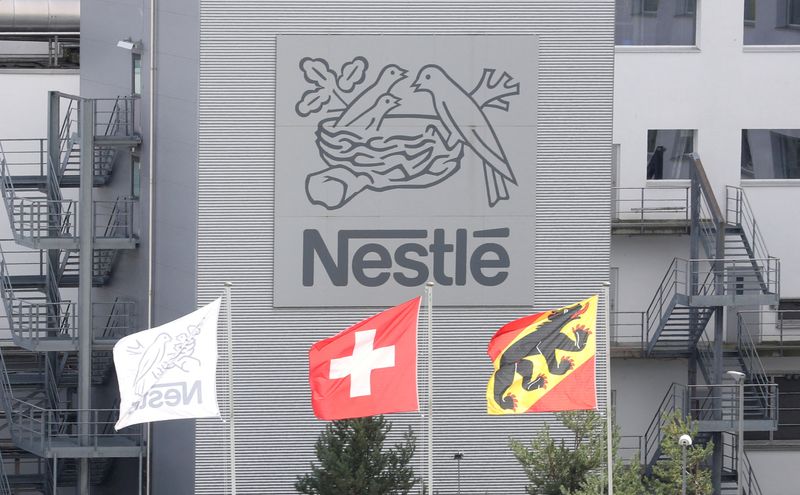By Richa Naidu
LONDON (Reuters) -Nestle and Danone are among firms whose product prices in France have risen by more than 10% this year, data shows, potentially putting them under government pressure to renegotiate with French retailers.
Finance Minister Bruno Le Maire said on June 9 he had secured a pledge from 75 food companies to cut prices.
Food industry lobby group ANIA set the following conditions for consumer companies to agree to the price cuts: that they had raised prices by over 10% during the last round of negotiations; and that their input costs had fallen by over 20% since March 1. It is not clear how many companies met those criteria, or which.
Whereas in most countries retailers and food producers adjust the price of products frequently, France has set by law a three-month time window when such negotiations can take place, between Dec. 1 and March 1 every year. Prices are then fixed for a full year, unless one-to-one deals include review clauses.
The French prices of products made by Nestle, the world's biggest food company, and Danone have increased by substantially more than 10% since the start of this year versus last year, according to NielsenIQ data analyzed for Reuters by Bernstein.
French shoppers have paid more than 20% more for Nestle products each month since January versus last year, the data showed, and price increases peaked at 36.6% in May. Nestle, whose brands include Maggi stock cubes and Kit Kat chocolate bars, declined to comment.
Similarly, stores sold products made by Activia yogurt owner Danone for between 11.2% and 16.7% more than last year in the first six months of the year.
"Just like the rest of the industry, inflation has driven increases in our input costs across energy, transport and raw materials. In response, and aligned with the French government’s call, we played our part in the collective effort to limit the inflationary impact on consumers," Danone said in a statement.
Danone said it ran promotion campaigns on its Danone Nature and Danette product ranges, and continued "to hold confident and transparent dialogue with our retail customers."
The NielsenIQ data shows the final prices retailers charge shoppers, and does not necessarily only reflect the prices food companies ask for from stores.
Both companies report earnings results this week.
Le Maire's office did not respond to a request for comment.
"The effects of price controls are likely to be negative in the longer term," Jack Martin, a portfolio manager at Nestle shareholder Oberon Investments, said.
"The inference is that companies are price gouging or taking advantage of the consumer when the reality is they are probably just passing on input costs largely out of their control, you would hope that as these ease pricing reflects this," he added.

Top U.S. and European investors have been flagging their concerns about high prices to consumer goods companies, with Janus Henderson going so far as to cut some stakes it holds and shorting food makers it believes are at risk of losing customers.
Consumers had not "really weakened yet" despite some downtrading to cheaper ranges, "but now, savings are starting to dissipate," said Gaurav Gooptu, a managing director in BNP Paribas (EPA:BNPP)' investment banking team.